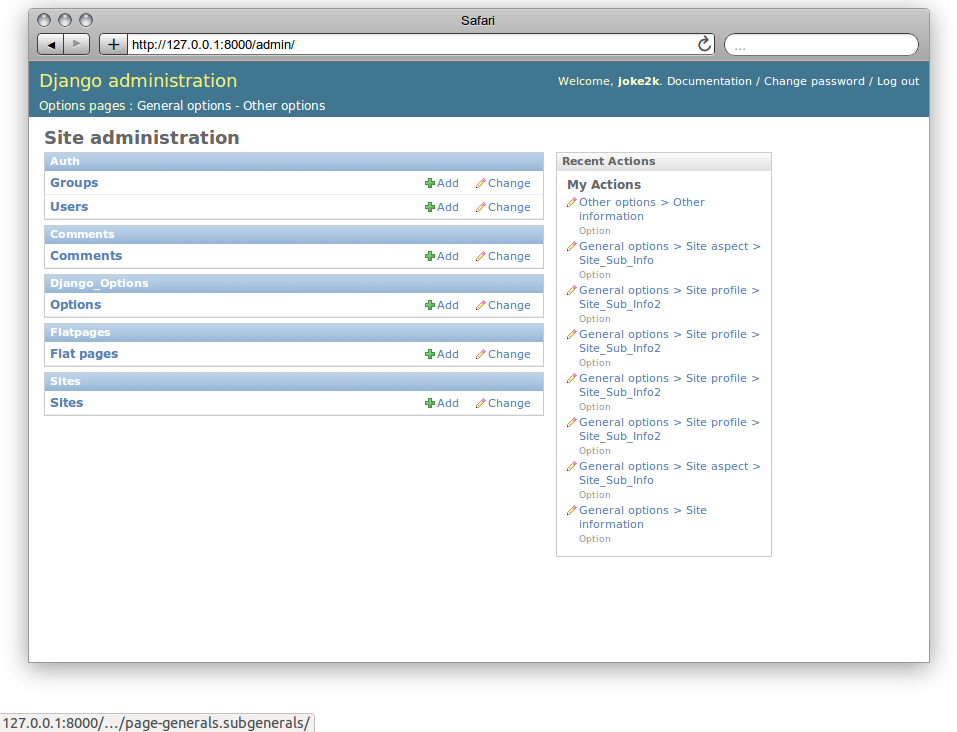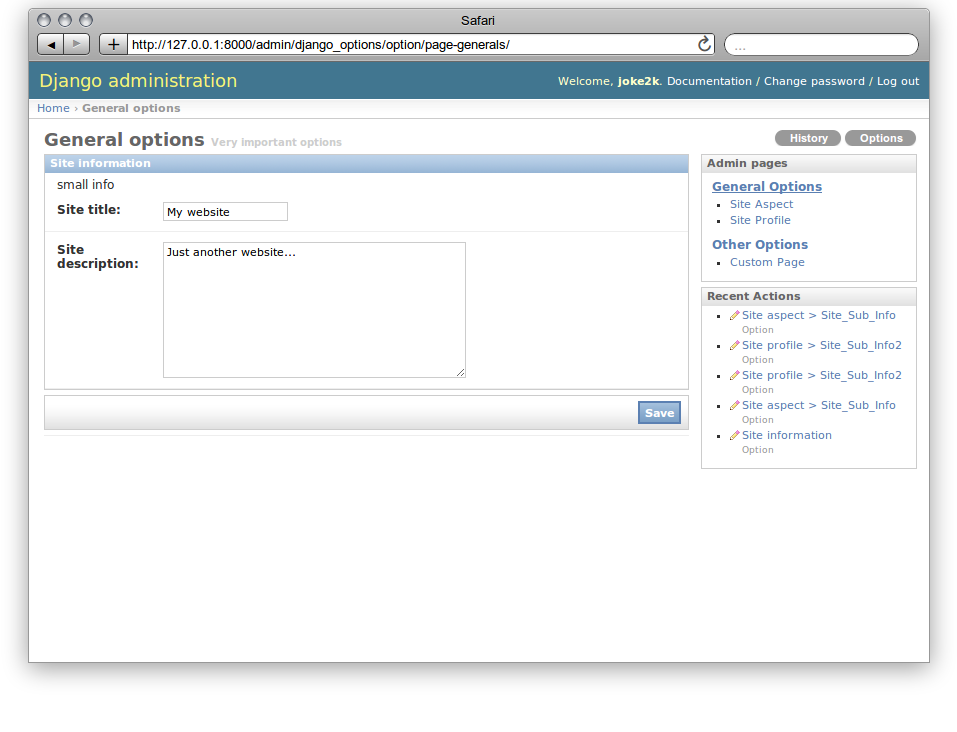A easy way to manage Site options in your django applications.
- Use db to store a generic dict of options (with CRUD operations)
- Stored values are converted to json string in a PickledObjectField(TextField)
- Every option can be autoload to reduce queries, and is lazy decoded from pickled string
- Every Site (django.contrib) has its options
- Admin interface to edit options manually
- Management command to manage options
Requirements:
- django.contrib.sites
- django.contrib.messages
- django-picklefield
Actually django-options on pypi is already taken, but you can install:
$ pip install git+git://github.com/joke2k/django-options.git#egg=django-optionsAdd django_options before 'django.contrib.admin' to extends admin/base_site.html :
INSTALLED_APPS = (
'django_options',
'django.contrib.admin',
...
'django.contrib.sites',
...
)Every action is executed with current SITE_ID provided by settings
from django_options import add_option, get_option, update_option, delete_option
get_option('welcome')
> None
get_option('welcome','default welcome')
> 'default welcome'
add_option('welcome', 'Hello world')
> True
get_option('welcome')
> 'Hello World'
update_option('welcome', 'Hello!')
> True
get_option('welcome')
> 'Hello!'
add_option('welcome', 'welcome if not already added')
> False
get_option('welcome')
> 'Hello!'
delete_option('welcome')
> True
get_option('welcome')
> Nonefrom django_options import add_option
add_option('welcome', 'Hello World', False)add_option and update_option, but only add_option sets autoload field. Autoloaded options is useful to reduce database queries.
from django_options import *
get_option('welcome')
> None
add_option('welcome' , 'Hello')
> True
option_is('welcome', 'Hello')
> True
option_not_is('welcome', 'Hello World')
> True
has_option('welcome')
> True
add_option('current_welcome', 'welcome')
> True
symbolic_option('current_welcome')
> 'Hello'Using APIs triggers a option_value_changed signal with `providing_args=["old_value","new_value","option"]`:
from django.dispatch import receiver
from django_options.signals import option_value_changed
@receiver(option_value_changed)
def my_handler(sender, *kwargs):
...Django-options extends admin interface to integrate a minimal hierarchical pages system, to allow us to build options form easily. Open admin.py in your application:
from django import forms
from django_options.admin import OptionsPage, admin_pages, option
from django_options.forms import OptionsForm
class GeneralsAdminPage(OptionsPage):
title = "General options"
description = "Very important options"
code = 'generals'
class SiteInfoForm(OptionsForm):
code = 'site_info'
title = 'Site information'
description = 'Small description of this form'
# options
site_title = option( forms.CharField(max_length=255) )
site_description = option( forms.CharField(widget=forms.Textarea) )
admin_pages.register(GeneralsAdminPage)This code, add a page called 'General options' to admin site, with a Form to edit site_title and site_description options. The option function add a "is_option" attribute to field, allowing to recognize it when Form.save is called. if you have any of the options that have keys with special characters, you can pass real option key name to option function:
...
site_title = option( forms.CharField(max_length=255), option_key='site.title' )
...That's it, simple right?
OptionsPage and OptionsForm needs a definition of code initialized class field.
You can build several pages and nest them, adding a field parent=MyParentAdminPage. If you need you can add forms to a page as you like, as nested OptionsForm sub-classes or using form_class_list=[] field. Latest approach helps to decide the sequence in which are shown the form
OptionsPage extends django FormView, but form_class is translated as first class in form_class_list field. OptionsForm extends django Form, it means that you can do everything you wants, plus a `optionsets`:
from django import forms
from django_options.admin import OptionsPage, admin_pages, option
from django_options.forms import OptionsForm
class OtherAdminPage(OptionsPage):
title = "Other options"
description = "some options"
code = 'others'
class SiteInfoForm(OptionsForm):
code = 'other_info'
title = 'Other information'
# options
my_stuff = option( forms.CharField(max_length=255), option_key='my.stuff' )
some_stuff = option( forms.CharField(max_length=255) )
other_stuff = option( forms.CharField(widget=forms.Textarea, required=False) )
optionsets = (
(None, {
'fields': (('my_stuff','some_stuff',),)
}),
('Advanced options', {
'classes': ('collapse',),
'fields': ('other_stuff',)
}),
admin_pages.register(OtherAdminPage)optionsets is a field that emulate the behaviour of ModelAdmin.formsets field.
Site options can be initialized before view execution and destroyed after template render. Useful to check global environment and to implement several aspects:
MIDDLEWARE_CLASSES = (
...
'django_options.middleware.OptionsLoaderMiddleware',
)
OPTIONS_LOADERS = ('app.options.TestOptionsLoader',)and in `app/options.py`:
from django_options import add_option, get_option, delete_option
class TestOptionsLoader(object):
@classmethod
def load_options(cls, request):
add_option('options_loader_prompted_value','This value is loaded and initialized in load_options() class method')
@classmethod
def unload_options(cls, request, response):
delete_option('options_loader_prompted_value')This methods are executed on process_request and process_response middleware hooks.
Use decorator to simulate Options middleware process:
from django_options.decorators import with_options
def my_loader(*args): add_option('welcome', 'Hi!')
def my_unloader(*args): delete_option('welcome')
@with_options(loader=my_loader, unloader=my_unloader)
def decorated_test_view(request):
... use 'welcome' option in view and template ...Django-options provides one tag option and two filters option and `or_option`:
# load template tags and filters
{% load options %}
# used as tag ( site_welcome may be not exists )
{% option 'site_welcome' %}
> None
# used as tag with default
{% option 'site_welcome' 'Hello world!' %}
> Hello world!
# used as tag with assignment
{% option 'site_welcome' 'Hello world!' as my_welcome %}
{{ my_welcome }}
> Hello world!
# used as filter
{{ 'site_welcome'|option:'Hello world!' }}
> Hello world!
# the name of the option may be a variable containing a string
{{ string_value|option:'Hello world!' }}
> Hello world!
# used as filter in if block tag
{% if 'site_welcome'|option %}
{{ 'site_welcome'|option }}
{% else %}
{{ 'Default welcome!' }}
{% endif %}
> Default welcome!
# optional filter
{{ not_existent_value|or_option:'site_welcome' }}
> None
# default value for unknown option name is None
{{ not_existent_value|or_option:'site_welcome'|default_if_none:'Hello world!' }}
> Hello world!
# useful for default values, or_option is ignored when filtered value exists
{% with existent_value='42' %}
{{ existent_value|or_option:'site_welcome'|default_if_none:'0' }}
{% endwith %}
> 42
# nice uses with iterators
{% for element in 'site_welcome'|option:'my-iterable-welcome-value' }}
{{ element }}
{% endfor %}
> m y - i t e r a b l e - w e l c o m e - v a l u e
# or_option with iterators ( suppose that site_welcome option is setted to 'Ciao!' )
{% for element in my_empty_personal_value|or_option:'site_welcome' }}
{{ element }}
{% endfor %}
> C i a o !To display saved options from command line:
$ python manage.py options
+------+-------------------+---------------------+---------------------+-------------------------+----------+
| Site | Option | Last change | Created at | Value | Autoload |
+------+-------------------+---------------------+---------------------+-------------------------+----------+
| 1 | site_title | 2013-01-01 10:08:22 | 2013-01-01 10:08:22 | My website | True |
| 1 | site_description | 2013-01-01 10:08:22 | 2013-01-01 10:08:22 | Just another website... | True |
+------+-------------------+---------------------+---------------------+-------------------------+----------+by key:
$ python manage.py options site_title
+------+------------+---------------------+---------------------+------------+----------+
| Site | Option | Last change | Created at | Value | Autoload |
+------+------------+---------------------+---------------------+------------+----------+
| 1 | site_title | 2013-01-01 10:08:22 | 2013-01-01 10:08:22 | My website | True |
+------+------------+---------------------+---------------------+------------+----------+ordered:
$ python manage.py options --order key
+------+-------------------+---------------------+---------------------+-------------------------+----------+
| Site | Option | Last change | Created at | Value | Autoload |
+------+-------------------+---------------------+---------------------+-------------------------+----------+
| 1 | site_description | 2013-01-01 10:08:22 | 2013-01-01 10:08:22 | Just another website... | True |
| 1 | site_title | 2013-01-01 10:08:22 | 2013-01-01 10:08:22 | My website | True |
+------+-------------------+---------------------+---------------------+-------------------------+----------+paginated:
$ python manage.py options --per-page 1 --page 1
+------+------------+---------------------+---------------------+------------+----------+
| Site | Option | Last change | Created at | Value | Autoload |
+------+------------+---------------------+---------------------+------------+----------+
| 1 | site_title | 2013-01-01 10:08:22 | 2013-01-01 10:08:22 | My website | True |
+------+------------+---------------------+---------------------+------------+----------+
Page 1 of 2To display options data uses prettytable.
Add a string value:
$ python manage.py options my_var --add 'my value'
Add my_var: 'my value'More complex value type:
$ python manage.py options my_var --update 2 --eval
Update my_var: 2--eval option executes eval(value,{},{}) with string provided value
$ python manage.py options my_var --update '{"myvar":1}' --json
Update my_var: {u'myvar': 1} json > '{"myvar":1}'a real python dict (pay attention: json format supports a subset of python field)
if in mymodule.py has a function:
def function( mystr ):
return {
'first_char' : mystr[0],
'full_str' : mystr,
'last_char' : mystr[-1]
}you can save the function results in my_var option with:
$ python manage.py options my_var --update 'mymodule.function' --execute 'ciao'
Update my_var: {'first_char': 'c', 'full_str': 'ciao!', 'last_char': 'o'} executed from "mymodule.function"deleting `my_var`:
$ python manage.py options my_var --delete
Delete my_var- Option expires ( add_option('welcome', 'Christmas welcome', expires_at='26/01/2012') )
- Change autoload, expired_at and site_id from command line
- Inline option form editor







